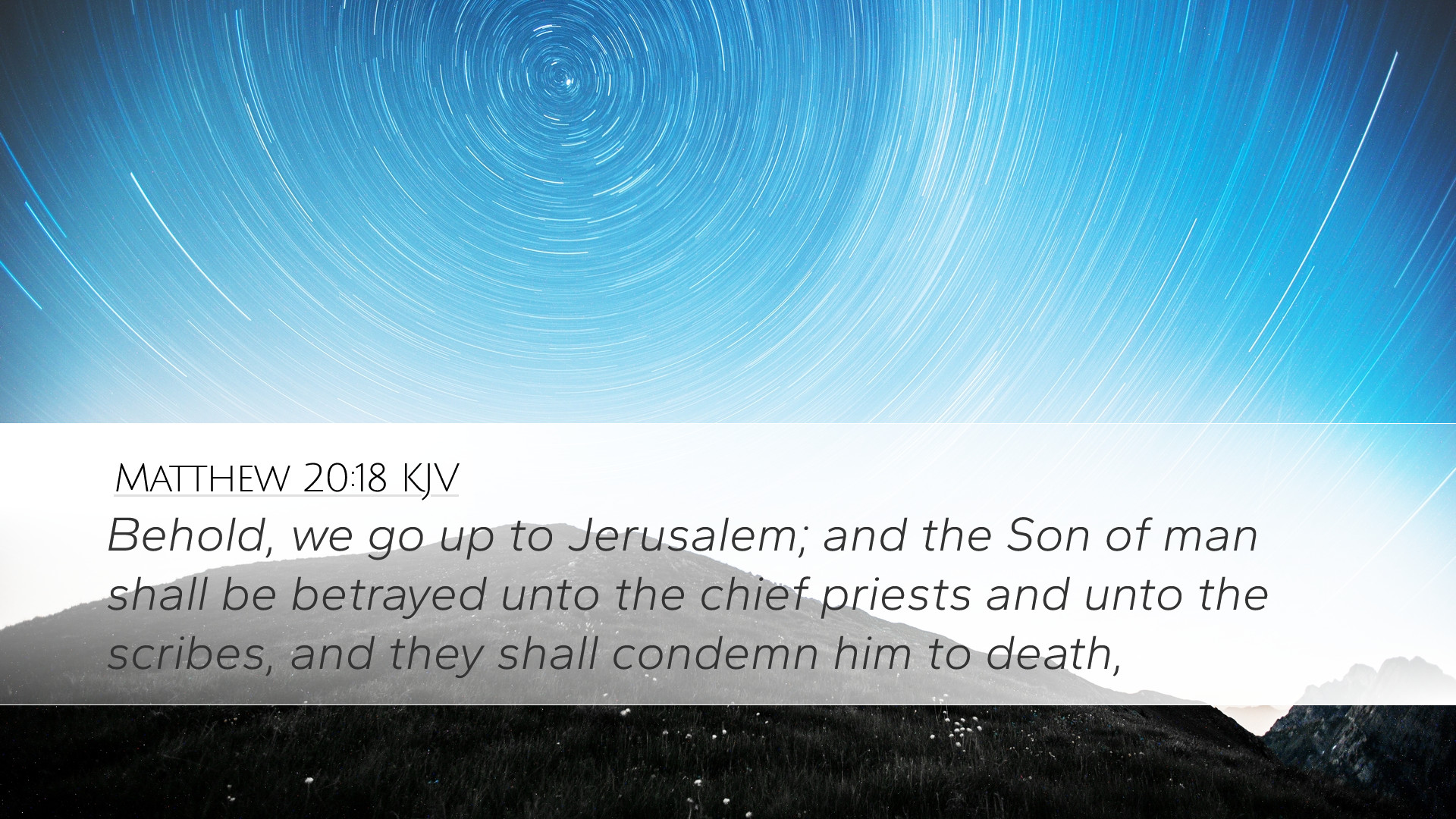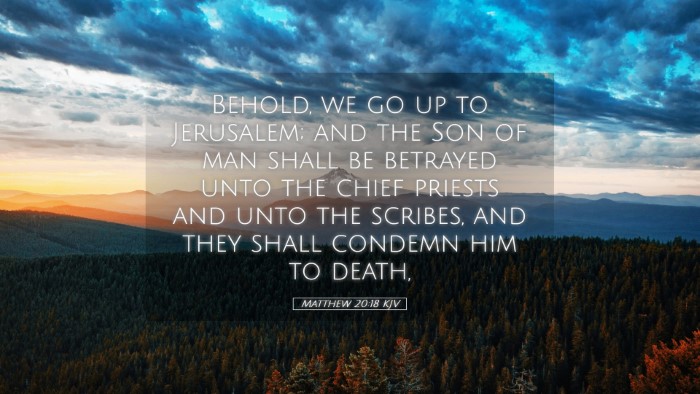Commentary on Matthew 20:18
Verse: "Behold, we go up to Jerusalem; and the Son of man shall be betrayed unto the chief priests and unto the scribes, and they shall condemn him to death."
Introduction
This verse is pivotal as it encapsulates the foretelling of Jesus’ passion. It presents a moment where Jesus prepares His disciples for the events to come, indicating the inevitability of His suffering, betrayal, and death. The significance of Jerusalem as the coming location of these events also cannot be overstated, as it serves as the backdrop of many prophetic fulfillments.
Contextual Analysis
Matthew 20:18 is situated within the larger narrative of Matthew 20, which discusses themes of discipleship, sacrifice, and the nature of God’s kingdom. Here, the context is particularly important as it hints at the contrast between human expectations of messianic power and the reality of Jesus' mission as a suffering servant.
Historical Context
Historically, Jesus was going to Jerusalem for the Passover, a time when the Jewish people commemorated their deliverance from slavery in Egypt. The prophecy of His suffering aligns with the expectation that the Messiah would come and suffer for the sake of His people. Understanding this context enriches our interpretation of Jesus' mission.
Theological Significance
As Matthew Henry notes, the announcement of betrayal sets a tone of foreboding that enriches the understanding of Jesus' sacrifice. It foreshadows the ultimate act of redemption that would come through His suffering—highlighting the paradox of the Messiah who reigns through suffering rather than earthly domination.
Commentary Insights
Matthew Henry: Henry reflects on the resolve of Jesus as He approaches Jerusalem. He identifies the anticipation of betrayal as a necessary step in the salvation plan. The act of going "up to Jerusalem" is significant because it signifies both the physical ascent to the holy city and the spiritual journey toward sacrifice and glory.
Albert Barnes: Barnes places emphasis on the inevitability of the betrayal that Christ predicts. He notes the role of the chief priests and scribes, emphasizing their collective authority and the gravity of condemning an innocent man to death. This aligns with the prophetic tradition of betrayal found in the Old Testament, illustrating that this plan of betrayal was known long before it occurred.
Adam Clarke: Clarke provides a detailed examination of the term "Son of man," affirming its deep roots in Old Testament prophecy (specifically from Daniel). He discusses how this title signifies both Jesus’ human identity and His messianic authority. Clarke emphasizes the importance of this title in terms of how Jesus identifies with humanity in suffering.
Exegesis of Key Terms
- “Behold”: A call to attention; Jesus desires His disciples to be aware of the serious nature of the forthcoming events.
- “Go up”: This emphasizes the journey toward Jerusalem, both geographically and spiritually, as Jesus heads towards final events in His ministry.
- “Betrayed”: This term carries with it deep emotional and relational implications, indicating a severe violation of trust by one of His own disciples.
- “Chief priests and scribes”: Represents the religious elite of the time, signifying a systemic betrayal not just by an individual but by a corrupted religious institution.
- “Condemn him to death”: This phrase emphasizes the gravity of their decision and reflects a judicial act of unjust condemnation, relevant to discussions of justice and mercy in theological discussions.
Application for Today
The implications of Matthew 20:18 are profound for contemporary believers. In the face of suffering and betrayal, Christians are called not only to acknowledge the events Christ foretold but to find hope in the redemptive purpose behind suffering. The narrative challenges believers to look beyond betrayal to see the greater narrative of God’s sovereignty and grace at work.
For Pastors and Theologians
This passage serves as a reminder of the importance of preaching the reality of Christ's suffering and betrayal in a world often unwilling to confront these themes. The call to prepare congregations for the reality of trials is essential in nurturing a faith that stands strong amid adversity.
For Students and Scholars
Matthew 20:18 offers rich ground for academic exploration. The interplay of prophecy, historical context, and theological reflection can lead to deeper understandings of the anticipation of the Passion narrative, as well as the implications of Jesus’ role as the suffering servant and the arrival of a new covenant.
Conclusion
In Matthew 20:18, Jesus reveals His understanding of His mission—one that involves suffering, betrayal, and ultimately, death. This foretelling serves as an invitation for believers to enter into the reality of His story, recognizing the deep love and sacrifice inherent in the life of the Son of Man. As we reflect on this verse, may we be moved to embrace our own call to discipleship, even amidst trials and suffering.


